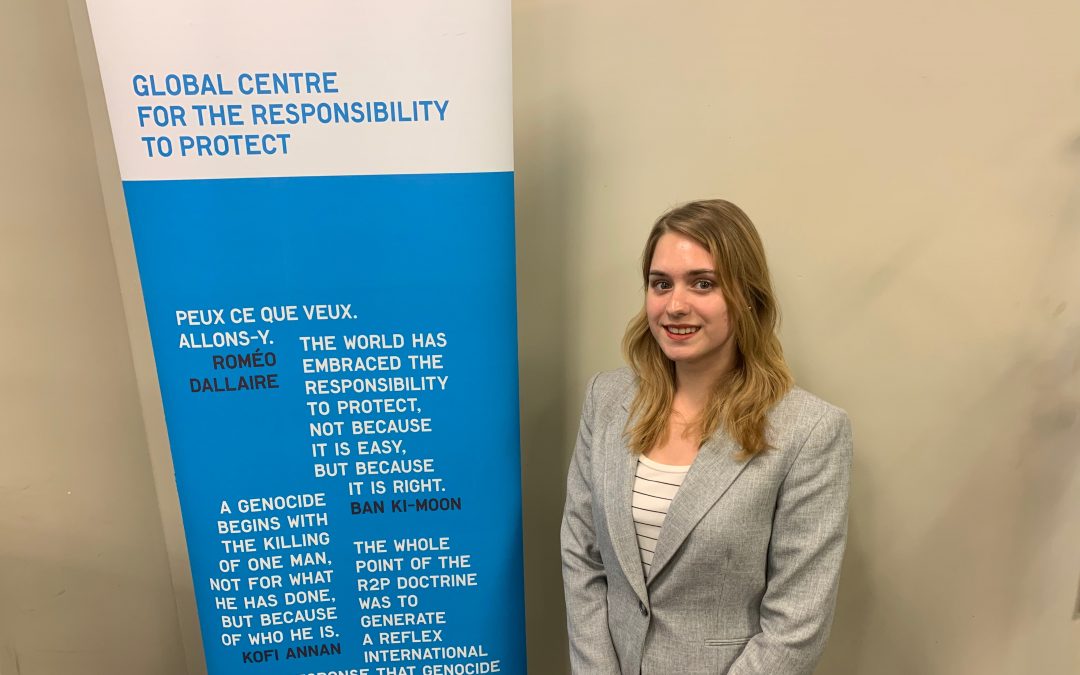
by Madison McHugh | Dec 10, 2019 | Internship Experiences, Undergraduate Students
My name is Stephanie Miller. I am a senior undergraduate student in the Diplomacy and International Relations program with a secondary major in Religious Studies and a minor in Arabic. I completed a research internship at the Global Centre for the Responsibility to Protect in Manhattan, New York.
The Global Centre is a research and advocacy organization that specializes in war crimes, genocide, ethnic crimes, and crimes against humanity. It works with governments, regional bodies, and other NGOs to operationalize the principles of the Responsibility to Protect doctrine into policy frameworks. It also monitors over 20 country situations either at risk or currently committing mass atrocities. As independent institutions, non-profits like the Global Centre are instrumental in ensuring accountability and encouraging inter-governmental action to prevent mass atrocity, and I had a wonderful time working with them.
My decision to pursue this internship was based in curiosity. Mass atrocities are crimes that make international headlines every day, but the corresponding prevention agenda is not something that people usually recognize, even in the classroom. The Global Centre works to bridge the gap between policy and responsible action, calling for the international community to commit to the principles outlined by the Geneva Convention and honor their agreements to protect civilians across the globe. I learned that while this work is not glamorous, it is entirely necessary.
Interning at the Global Centre taught me the difference between humanitarian work and human rights advocacy, cultivating a newfound interest in both. Prior to this internship, I thought that the two terms were mutually interchangeable, and I found that this a common misconception often overlooked. This experience taught me new and transferable skills that are applicable to both fields, honing practical expertise in report writing and analysis, oral communication, conflict mediation, and public engagement. I don’t think I could have found a more supportive and encouraging environment as I developed these new skills, and I look forward to carrying them into my career.
One of the challenges I faced in the beginning of my internship was separating myself from my work. The subject material I was dealing in daily was sometimes difficult to process, and in order to succeed in the position, I had to learn how to leave work in the office rather than take it home with me. I began setting healthy boundaries for myself before I could devote my time and energy to a mission that I quickly grew to care about. This internship taught me more than just practical skills – it taught me a life lesson that many don’t learn until much later, and for this I will always be grateful.
My advice to students looking for internships is to not limit yourself to searching only in the field you are interested in. Diversifying your interests enables you to take advantage of opportunities that you may not have had otherwise. My career goals were vastly different going into this internship than they are now. Working at the Global Centre made me re-evaluate my priorities and consider what I really want to do with my degree after I graduate, which is something I do not think I would have been forced to reckon with if I had worked anywhere else. Internships do not always change your outlook on life, but mine did. I gained new skills, new interests, and a new perspective on the field I want to go into.
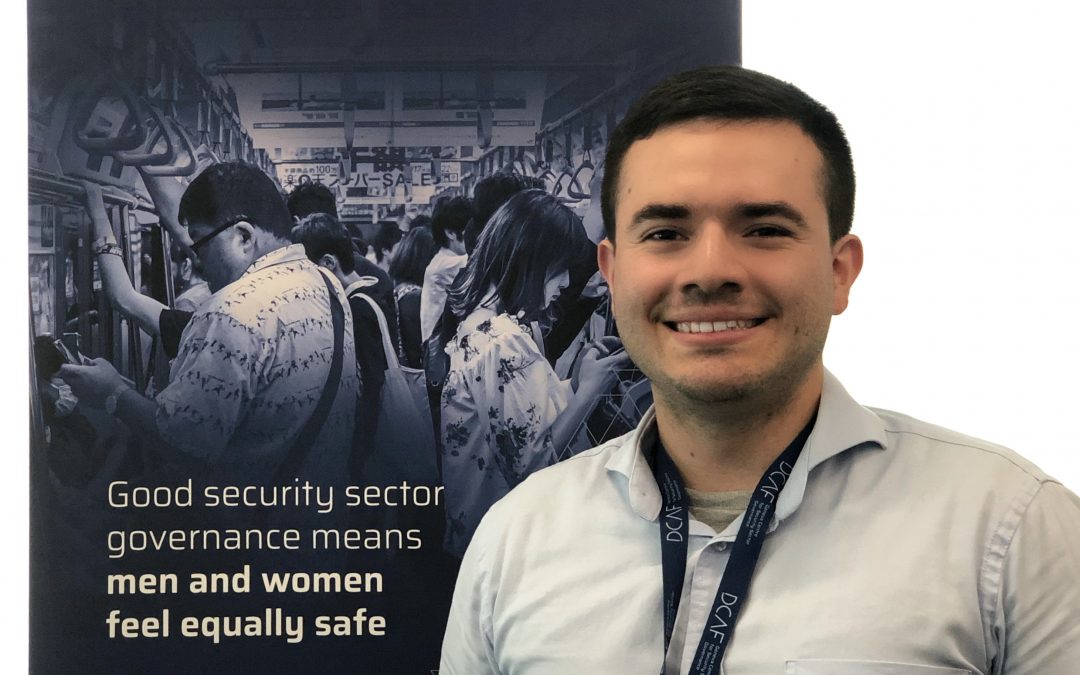
by Madison McHugh | Aug 28, 2019 | Graduate Students, Internship Experiences
My name is Emanuel Hernandez. I am a second-year graduate student pursuing an M.B.A. in Supply Chain Management/M.A. in International Relations dual-degree program at Seton Hall University. In the summer, I was selected as the School of Diplomacy’s Sergio Vieira de Mello Fellow, a fellowship program created in honor of a Brazilian UN diplomat who was killed in a bombing while working as the UN Secretary-General’s Special Representative in Iraq.
De Mello fellows are placed as research assistants in project-based work at the DCAF – Geneva Centre for Security Sector Governance for a duration of eight weeks. DCAF, an international foundation under Swiss law, is dedicated to improving the security of states and their populations within a framework of democratic governance, the rule of law, and respect for human rights. DCAF helps its partner states and international actors to improve the governance of their security sectors through inclusive and participatory reforms based on international standards and practices. The foundation currently has 63 member states and operations in more than 74 countries.
I interned for the Latin America & Caribbean (LAC) Unit within the Operations Department. As one of the newest units at DCAF, we had a small team, with only a head of division, two project coordinators, one financial officer, and two interns (including myself). Working in such a small team comes with both challenges and perks.
One of the main advantages of working in a small team was the one-on-one feedback and mentoring from my peers. We worked in a dynamic environment that required everyone in the team to be able to perform multiple tasks. During my time there, I prepared multiple research reports and concept notes to be used in funding proposals, translated and edited publications and legal documents for international cooperation projects, and prepared daily briefs on security sector news in DCAF’s focus countries in LAC. I also had the opportunity to improve my professional writing skills in Spanish.
However, being responsible for multiple tasks in a small team came with its own challenges. Sometimes, the workload exceeded the time available in a given day, so I needed to learn how to prioritize tasks effectively to make sure that I got everything accomplished at the right time.
Participating in the internship reassured me of my choice to pursue a dual-degree program. My background in international relations was essential for processing data, understanding complex issues, and delivering information concisely in research reports. My education in business administration, on the other hand, was particularly useful in understanding financial statements and legal documents needed to implement and monitor international projects. I would certainly recommend this internship to anyone that is interested in international project-based work.
Geneva is a vibrant city during the Summer, and DCAF is located at the heart of international Geneva. While my objective had always been to work in the New York/Washington area, this experience opened my eyes to the professional opportunities in Geneva, which serves as a hub for hundreds of international organizations, multinational companies, and non-governmental organizations. Based on my experience with DCAF, I will be keeping an eye on jobs in Geneva when I begin applying for full-time positions.
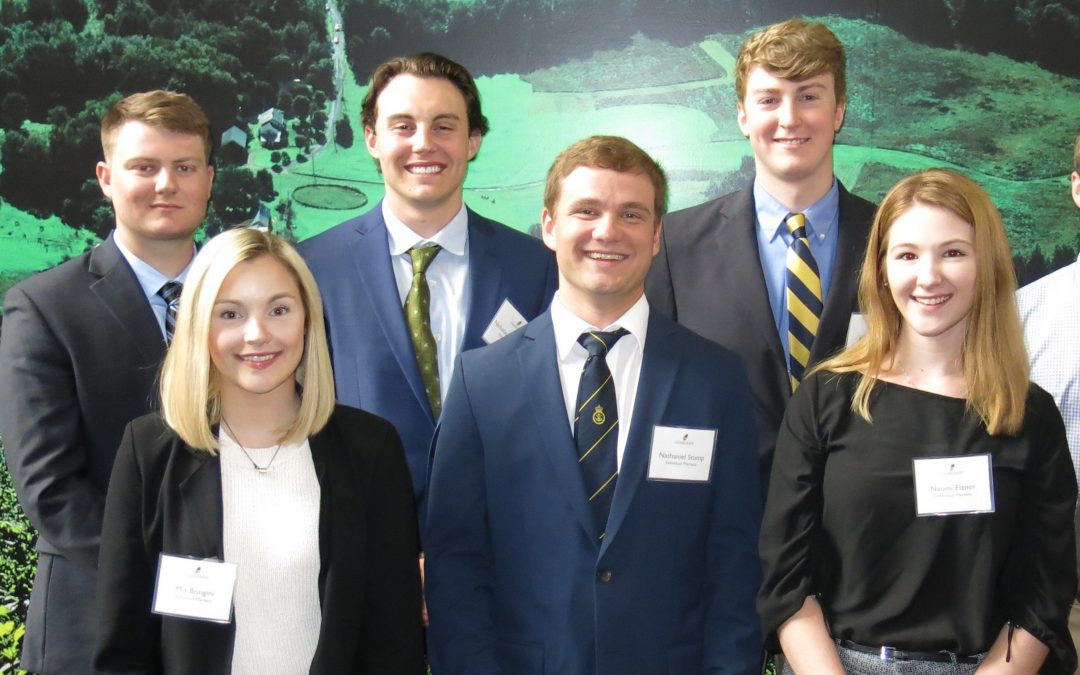
by Madison McHugh | Mar 22, 2019 | Internship Experiences, Undergraduate Students
My name is Austin O’Neill, and I am a senior double-majoring in International Relations and Economics with a minor in Arabic. I completed an internship at Guardian Life Insurance Company of America this semester in addition to my previous full-time internship last summer. My position is in Disability Insurance individual markets under the Product Strategy team.
I originally chose to intern at Guardian Life because they have a large presence in my hometown of Pittsfield, MA, offering a great opportunity very close to home over the summer. I continued to intern with Guardian Life when the Product Strategy team asked me to stay on during the school year to assist with a variety of projects, which indicated that I am considered a valued member of the team.
The department focuses on many different areas of disability insurance products, including research and development, competitive research, product training, filing, and support. I had the chance to assist across every responsibility, providing me with a broad spectrum of learning opportunities. My main responsibilities were preparing files for state insurance agencies, altering documents and content with the rebranding team, and creating PowerPoints and spreadsheets for presentations by the executive team.
One interesting project I completed was designing the PowerPoint for a new product pitch presented by the executive team. The product was considered revolutionary for the market, and I was tasked to express the characteristics of the product. This project was exciting as it had real implications for the highest-ranking officers of Disability, and it allowed me to showcase skills I have learned at the internship and through classes at Seton Hall.
I found a great balance in building skills between my internship and course studies. I became very familiar with Excel, which is a skill I have utilized at school with assignments such as my senior thesis, as well as data collection for the Product Strategy team. While working on product filing assignments for Guardian Life, I received exposure to Adobe Pro, which is important for many different business operations, but was also applicable as a document editing tool for my studies. Additionally, it was interesting to work on the front-end and back-end of rebranding for a large company. I edited and updated documents, and I tested webpages and programming software for consumer friendliness. The skills I learned from these duties are numerous and will help me in my future career.
My internship at Guardian Life helped me develop in both my professional and academic life. I networked across all business areas and may seek full-time opportunities at Guardian Life after graduation. Even as a Fortune 250 company, Guardian Life still seeks to receive input from all its employees, from interns to executive teams. For these reasons, I would suggest others to seek internships at Guardian Life for learning and development in the private sector.
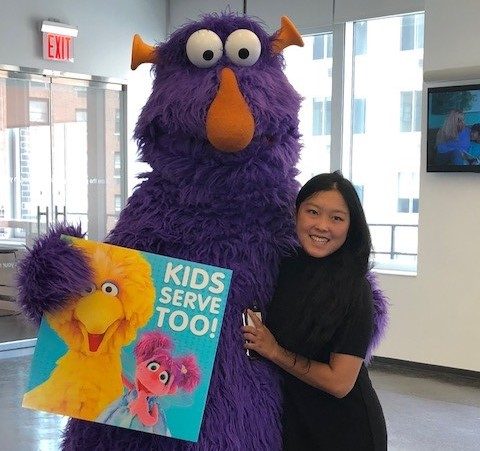
by Madison McHugh | Aug 20, 2018 | Internship Experiences, Undergraduate Students
My name is Kylie, and I am a senior Diplomacy and Modern Language major with a minor in Economics. I interned in Sesame Workshop’s Philanthropic Development Department. Sesame Workshop is the umbrella nonprofit educational organization that produces Sesame Street, which is far more than just the show. The organization works in 150 countries and has initiatives that range from dealing with grief for families of military personnel in the US to performing outreach for those affected by HIV in South Africa. I was drawn to this internship by Sesame’s creative approach to tackling difficult community issues worldwide, and I wanted to pursue my interest in education at a large organization.
My responsibilities included research, filing, inventory, team meetings, and mail management. Although the work wasn’t always glamorous, Sesame interacts with incredible people and entities, from Priscilla Chan to the Canadian government, which allowed me many opportunities to network. I also completed two major projects during my time at Sesame: the first was completing research for Sesame’s 50th anniversary next year, and the second was labeling production documents and plans from the Bangladeshi program’s ninth season production and education initiative. These projects allowed me to embrace the “insider’s view” and appreciate the kind of attention that goes into various initiatives.
Interning at Sesame showed me that nonprofits in education are an exceptional pathway to making a difference, even if it is not as flashy as counterterrorism or cybersecurity. In addition, I realized the intersection of elementary education and diplomacy as Sesame’s programs seek to simplify universal values and international issues to a level that children can internalize. Their goal is not to teach the statistics and policy, but to teach understanding and acceptance. They are instilling habits for children that lead to better lifestyles. It’s not just about learning the alphabet and numbers, but learning about the respect needed to heal divides in the ethnically and religiously diverse streets of Isreal (Rechov Sumsum) or to empower girls in Nigeria (Sesame Square). Many children in countries that Sesame Street airs in obtain their primary education through the show due to conflict, poverty, or the lack of a school system.
My time at Sesame was an amazing experience that taught me the dynamics of how large offices work and the responsibilities of various departments. As an intern, I completed informational interviews with department heads, and my last semester project included researching part of the department to make suggestions on improvements or initiatives. My project on the Yellow Feather Fund included marketing and development strategies to increase the reach of the fund, and this allowed me to explore business ideas outside of my field of interest.
Overall, I would recommend this internship or any other internship within Sesame, as the office is a welcoming environment and one dedicated not only to educating the public but enriching its interns with new experiences and ideas.
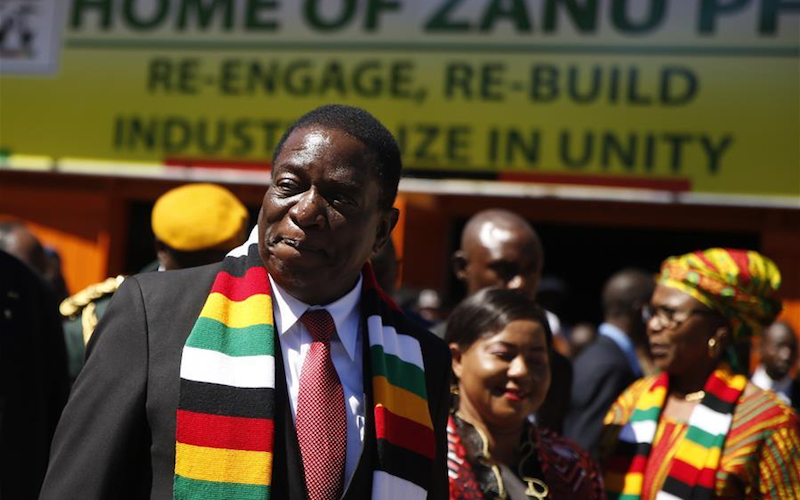
by Madison McHugh | May 9, 2018 | Graduate Students
M.A. first-year Diplomacy student Erick Agbleke originally published an op-ed piece on “China’s Neocolonialism in Africa” in the Journal of Diplomacy. The piece was then chosen for publication in the International Policy Digest.
Below is a re-print of the article, also located at the link above.
Behind the Goodwill Aid: China’s Neo-Colonialism in Africa
Erick Agbleke
December 2018 will mark the 3rd anniversary of the 6th Ministerial Conference of the Johannesburg Summit of the Forum on China-Africa Cooperation (FOCAC), where China’s Xi Jinping pledged to strengthen an already steady relationship with the African continent. With a promising speech to the African Union leadership and Heads of State, Xi promised to deliver a $60 billion package over the next 3 years that will include aid, interest-free loans, and capital.
To the 53 African countries that were in attendance, this was a welcome gift as Africa was just coming out of the ebola outbreak which left devastating effects in its path. It seems that China has found a way to expand its sphere of influence in the globalization race of the 21st century. Moreover, it is on the way to surpass the United States in terms of relevance and impact within the area. So, how and why does this matter, given the United States’ interest in the African region?
It is no secret that foreign aid can be used as a bargaining chip, where it goes a long way in facilitating international relations. For instance, the Marshall Plan of post-World War II was not initiated just out of the good heart of the US government. It was rather erected as a roadblock to the spread of communism in Western Europe. In the same way, China’s willingness to pour money and resources into the continent of Africa is not motivated by some form of sincerity towards the people, but rather to further its own agenda.
This financial sponsorship has ironically gained popularity with African leaders who welcome with open arms the gifts that Zhongnanhai come bearing to them. This allows China to bring businesses to the continent and build much-needed infrastructure, such as railroad tracks for transportation and commerce while instituting their ‘one belt one road’ initiative. However, this form of investment turns out not to be mutually beneficial to the African people. It buries the continent in insurmountable debt that the Chinese government maintains as leverage, a boon for them in terms of strategy. Case in point, the establishment of the first Chinese Naval base in Djibouti, which enables them to gain quick access into the Indian and Atlantic Ocean.
The West has a history of turning a blind eye towards Africa and its citizens, and Africans have come to accept such western indifference. Despite many clearly botched and stolen elections, including evidence of human right violations and overt dismissal of the rule of law, western powers have refused to hold many leaders accountable for their actions, no matter how vile they may be.
The silence from these countries who are typically quick to speak up and take actions when their interests are being threatened has emboldened some of these African leaders and empowered them to continue governing as they see fit. In the end, the collateral damage becomes the people they have sworn to lead and protect. China striving to be the biggest supporter and financier on the continent should be something that we should be concerned about; given the fact that they themselves are a substantial perpetrator of human rights violation and governmental intimidation. China’s waxing power on the continent may lead to an even greater disregard of human rights violations.
For the United States to regain a strong foothold within Africa and further advance its agenda of peace, power, prosperity, and principle, it must be willing to be the biggest stakeholder in terms of aid and financial support of the continent by investing in its growth and development. However, monetary support is not the only path to winning hearts and minds. Up until the Trump administration was handed control of the government, the U.S. was the best destination for education and business ventures. To some, the American Dream was still alive and attainable if they worked hard and played by the rules. This is no longer the case as the current administration sees fit to walk a hard line against immigration.
Programs such as the Temporary Protected Status (TPS) or the Deferred Enforced Departure (DED), which gave a way for multitudes of individuals that fled the atrocities in their civil war-torn countries to find refuge in America are being terminated. Families that have spent most of the past two or three decades building a new life here are being urged by a deadline to return to a country that is no longer theirs.
These more dismissive and closed policies can lead to a drop in foreign influence for a country such as the U.S., whose popularity has been on the decline over the last ten years due to the conflicts in the Middle East and elsewhere in the world. The policies being pushed by the Trump administration could, in turn, make it hard for the U.S. to gain support on the African continent while trying to curb the rise and effectiveness of terrorist groups that are operating in the area and threatening its interests.
The U.S. which has always championed itself as the vanguard for human rights around the world owes it to itself and for the success of its foreign policy to stand up to China’s expansion strategy. It will help tremendously in deterring terrorism and radicalization in Africa. However, the work should not solely rest on the Americans’ shoulders. The leadership in African countries must first recognize the neo-colonial practices that China is indirectly imposing on them and then stand against such unfair practice. To break free from dependency on outside actors and grow, there must be a willingness among the consortium to take responsibility for the development of the African continent which should be done in-house.

by Madison McHugh | Nov 29, 2017 | Graduate Students, Internship Experiences
My name is Marissa Hutton, and I am currently a second year graduate student completing a dual degree in Diplomacy and International Relations and Strategic Communication. During the summer of 2017, I interned at an international communications firm, BLJ Worldwide in New York City. Daily responsibilities varied, but over the course of a week, I would typically produce memos on a variety of topics, create and manage databases of contacts and edit different pieces of writing.
The great thing about BLJ is that it was rare for interns to be tied down to a single project all day. The firm’s numerous clients meant that interns completed multiple tasks in a day and utilized different skill sets to assist the account managers. Even the smallest task of gathering contact information could become a springboard for an account manager to set up vital meetings for clients that could have long-term effects on their business. That was one of my favorite parts of being in the office: no job was too small and everyone appreciated the work done for them.
In terms of diplomacy, my internship required that I write, analyze, and conduct research on multiple current events each day. Our work tended to focus on diplomatic hot spots and areas that are sources of much discussion and analysis for a diplomacy student. Each day, interns ventured into Google News to pull any media mentions in order to create a report that illustrated the “public mood” in a 24-hour period. Due to international events at the time, some clients received an extensive amount of coverage, which then required me to conduct research on the media outlets and institutions discussing them, a process that exposed me to important influencers in the media and academia.
I also found that a large number of the case studies I was asked to analyze in my courses help me complete tasks in my internship. In my communications courses, these studies gave me a bank of examples to look back upon and draw new conclusions from, whereas in my diplomacy courses, the case studies provided me with important background information and policy analyses that I drew upon in writing memos for clients on diplomatic matters and institutions.
In terms of my career choice, this internship provided me with an answer to that ever-looming question: is this really what I want to do with my life? Thankfully, that answer was a resounding yes. My elders always said that if you are able to find enjoyment in all aspects of your career, then you never truly ‘work’ a day in your life. That is what I discovered about myself through my work at BLJ. I sincerely enjoyed everything from media monitoring to editing to the endless amounts of reading required to stay on top of the game. While my past internship experiences provided me with professional skills and knowledge, this one gave me much more: experiential confirmation that I made the right choice.






